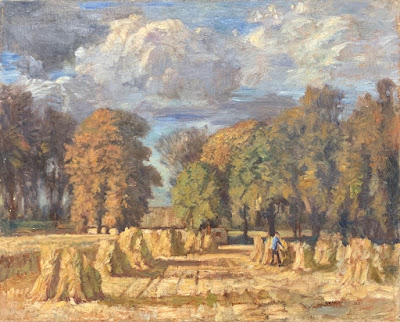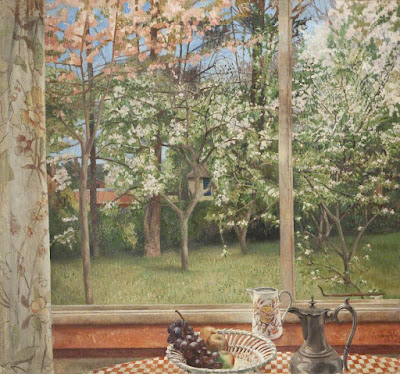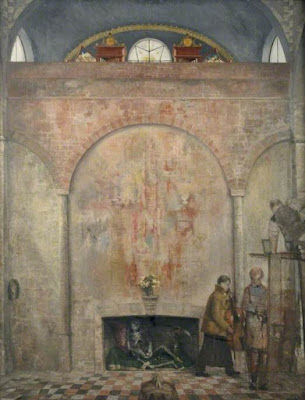All I ask for in life is peace and quiet, accompanied by an occasional fugitive encounter with Beauty and Truth. How does one go about pursuing these elusive will-o'-the-wisps? I have no wisdom to impart on this score. What do I know? I go for a daily walk in the green and blue and parti-colored World. Each day I read one or two poems. I try to pay attention. Above all, I try to be grateful. But failure is an everyday occurrence.
This course of action is no doubt simplistic and unambitious (and, some might argue, solipsistic). But I have wise and reliable guides. This entails looking backwards. How presumptuous and narrow-minded it is to imagine that we inhabitants of the contemporary world know more about life than those who have preceded us. Everything we need to know about how to live can be found in the past. We moderns have nothing to add.
From early days I have been at odds with the world;
My instinctive love is hills and mountains.
By mischance I fell into the dusty net
And was thirteen years away from home.
The migrant bird longs for its native grove.
The fish in the pond recalls the former depths.
Now I have cleared some land to the south of town;
Simplicity intact, I have returned to farm.
The land I own amounts to a couple of acres.
The thatched-roof house has four or five rooms.
Elms and willows shade the eaves in back,
Peach and plum stretch out before the hall.
Distant villages are lost in haze,
Above the houses smoke hangs in the air.
A dog is barking somewhere in a hidden lane,
A cock crows from the top of a mulberry tree.
My home remains unsoiled by worldly dust;
Within bare rooms I have my peace of mind.
For long I was a prisoner in a cage,
And now I have my freedom back again.
T'ao Ch'ien (365-427) (translated by James Hightower), in James Hightower, The Poetry of T'ao Ch'ien (Oxford University Press 1970), page 50. The poem (which is untitled) is the first poem in a five-poem sequence titled "Returning to the Farm to Dwell." Ibid, page 50.
"Thirteen years away from home" refers to T'ao Ch'ien's career as a government official, a position he qualified for by passing a rigorous series of civil service examinations (which required extensive knowledge of, and the ability to skillfully write, poetry). (I described these examinations, as well as the typical course of a governmental career in China, in
a previous post.) It is fortunate that T'ao Ch'ien escaped "the dusty net" of the world. He is arguably the finest Chinese lyrical (
shih) poet prior to the well-known poets of the T'ang Dynasty three to four centuries later (Li Po, Tu Fu, Wang Wei, Po Chü-i, and Han-shan). But he is perhaps equally revered in China for the decision he made to abandon his bureaucratic career in order to return to the country to become a farmer. He was not a wealthy gentleman-farmer. He farmed to make a living, and he and his family suffered failed crops and the loss of a home to fire. The vicissitudes and joys of this life are documented in his poems, and, although occasional misgivings and laments may be found in the poetry, he remained true to his commitment.
Of course, poets at all times and in all places have longed for what T'ao Ch'ien longed for in Fourth and Fifth Century China: to be free of "the dusty net" and of "worldly dust."
Happy were he could finish forth his fate
In some unhaunted desert, most obscure
From all societies, from love and hate
Of worldly folk; then might he sleep secure;
Then wake again, and give God ever praise,
Content with hips and haws and bramble-berry;
In contemplation spending all his days,
And change of holy thoughts to make him merry;
Where, when he dies, his tomb may be a bush,
Where harmless robin dwells with gentle thrush.
Robert Devereux, Earl of Essex (1566-1601), in Norman Ault (editor), Elizabethan Lyrics, From the Original Texts (Longmans, Green and Co. 1928), page 270. Alas, I fear that Devereux never found his "unhaunted desert": his short and tempestuous life ended with a beheading for a plot against Queen Elizabeth I. But perhaps he at least now lies "where harmless robin dwells with gentle thrush."
The pursuit of "content" is a recurring theme in Elizabethan poetry (together with love and death). This makes sense: "content" seems to be more attainable, and less transitory, than the fickle, ever-changing chimera of "happiness" (whatever that is).
Were I a king, I could command content.
Were I obscure, unknown should be my cares.
And were I dead, no thoughts should me torment,
Nor words, nor wrongs, nor loves, nor hopes, nor fears.
A doubtful choice, of three things one to crave,
A kingdom, or a cottage, or a grave.
Edward de Vere, Earl of Oxford (1550-1604), Ibid, page 110.
James Torrington Bell (1892-1970), "Hatton Farm, Inverarity"
Although T'ao Ch'ien was certainly influenced by Taoism, Confucianism, and, to a lesser extent, Buddhism, his decision to escape "the dusty net" was ultimately based upon his own sense of what was right for him, not upon philosophical or religious principles. His reasons are articulated in the poem above, and we should take him at his word, for he was never one to equivocate or dissemble: he had always been "at odds with the world;" he wished to keep his "simplicity intact;" he sought "peace of mind" and "freedom." Near the end of his life, he wrote his own prose "Elegy." In it, he states: "There was little enough reward for my labor, but my mind enjoyed a constant leisure. Content with Heaven and accepting my lot, I have lived out the years of my life. . . . Aware of my destined end, of which one cannot be ignorant, I find no cause for regret in this present transformation. I have lived out my lifespan, and all my life I have desired quiet retirement. Now that I am dying, an old man, what have I left to wish for?" (Translated by James Hightower, in James Hightower, The Poetry of T'ao Ch'ien, page 6.) He returns to these essential themes in nearly every poem he wrote.
Fall chrysanthemums have beautiful colors:
dew still on them, I pick the blossoms,
float them on this drowner of care --
it makes me feel farther than ever from the world.
Though I'm alone as I pour my wine,
when the cup's empty, somehow the jar tips itself.
The sun has set, all moving things stilled;
homing birds hurry to the woods, singing,
and I whistle jauntily by the eastern eaves --
another day I get to live this life.
T'ao Ch'ien (translated by Burton Watson), in Burton Watson, The Columbia Book of Chinese Poetry: From Early Times to the Thirteenth Century (Columbia University Press 1984), page 136. The poem is untitled. It is the seventh poem in a sequence of twenty poems titled "Drinking Wine." Ibid, page 134. Watson provides this note to the phrase "this drowner of care" in the third line: "Literally, 'the thing for forgetting care,' one of T'ao's terms for wine. The chrysanthemum was believed to have medicinal properties." Ibid, page 136.
As I noted above, those who have preceded us have provided us with all we need to know about how to live. Thus, for instance, approximately two centuries prior to T'ao Ch'ien's time, a Roman emperor wrote this (in Greek, the language of his Stoic teachers):
"A man may any hour he pleases retire into himself; and nowhere will he find a place of more quiet and leisure than in his own soul: especially if he has that furniture within, the view of which immediately gives him the fullest tranquillity. By tranquillity, I mean the most graceful order. Allow yourself continually this retirement, and refresh and renew your self. . . . For the future, then, remember to retire into this little part of yourself. Above all things, keep yourself from distraction, and intense desires. . . . Have these two thoughts ever the readiest in all emergencies: one, that 'the things themselves reach not to the soul, but stand without, still and motionless. All your perturbation comes from inward opinions about them.' The other, that 'all these things presently change, and shall be no more.' Frequently recollect what changes thou hast observed. The world is a continual change; life is opinion."
Marcus Aurelius, Meditations, Book IV, Section 3, in Francis Hutcheson and James Moor (translators), The Meditations of the Emperor Marcus Aurelius Antoninus (1742).
Given the sad and harrowing circumstances of his life, Ivor Gurney was not able to fashion a path to peace and quiet similar to that embodied in the lives and words of T'ao Ch'ien and Marcus Aurelius (who each, it should be said, had their own struggles and doubts). And yet Gurney's poetry comes to mind as I think about the pursuit of peace and quiet, Beauty and Truth. He did pursue them, and he sometimes -- albeit fitfully and briefly -- found them.
Soft rain beats upon my windows
Hardly hammering.
But by the great gusts guessed further off
Up by the bare moor and brambly headland
Heaven and earth make war.
That savage toss of the pine boughs past music
And the roar of the elms. . . .
Here come, in the candle light, soft reminder
Of poetry's truth, while rain beats as softly here
As sleep, or shelter of farms.
Ivor Gurney, Selected Poems (edited by George Walter) (J. M. Dent 1996), page 97. The poem is untitled. It was not published during Gurney's lifetime. George Walter provides this note to the text of the poem: "undated manuscript on loose sheet. A typescript version notes that this was 'written at Dartford, probably about 1926 or 1927'." Ibid, page 105. Gurney was confined in the City of London Mental Hospital (known as "Stone House") at Dartford (in Kent) from December of 1922 until his death in December of 1937. The ellipses in line 7 appear in the manuscript.
Knowing what Gurney went through in his life, reading a poem such as this breaks one's heart. The phrase "shelter of farms" in the last line leads naturally to this:
The Shelter from the Storm
And meantime fearing snow the flocks are brought in,
They are in the barn where stone tiles and wood shelter
From the harm shield; where the rosy-faced farmer's daughter
Goes to visit them.
She pats and fondles all her most favourite first.
then after that the shivering and unhappy ones --
Spreads hay, looks up at the noble and gray roof vast
And says 'This will stop storms.'
Her mind is with her books in the low-ceilinged kitchen
Where the twigs blaze. -- and she sees not sheep alone
of the Cotswold, but in the Italian shelters songs repeating
Herdsmen kind, from the blast gone.
Ivor Gurney, Selected Poems, page 92. George Walter notes that the poem is found in a "group of manuscripts on loose sheets," with some of the sheets "dated September 1926." Ibid, page 105. The punctuation is as it appears in the manuscript. The poem was not published during Gurney's lifetime.
[A side-note: I recommend Kate Kennedy's recent biography of Gurney: Dweller in Shadows: A Life of Ivor Gurney (Princeton University Press 2021). I also recommend Ivor Gurney: The Complete Poetical Works (Oxford University Press), the ongoing multi-volume edition of Gurney's poetry which is being wonderfully presented and edited by Philip Lancaster and Tim Kendall. Volume I: March 1907-December 1918 was published in 2020, and four additional volumes are forthcoming. Gurney deserves this attention.]
James Torrington Bell, "Farmhand Stacking Hay Stooks"
T'ao Ch'ien returns to his chrysanthemums beneath the eastern hedge and to homing birds at dusk in the following serene and simple poem, which captures the essence of the life he sought to live, yet reminds us that, in the end, words are -- quite rightly -- of no use.
I built my hut in a zone of human habitation,
Yet near me there sounds no noise of horse or coach.
Would you know how that is possible?
A heart that is distant creates a wilderness round it.
I pluck chrysanthemums under the eastern hedge,
Then gaze long at the distant summer hills.
The mountain air is fresh at the dusk of day;
The flying birds two by two return.
In these things there lies a deep meaning;
Yet when we would express it, words suddenly fail us.
T'ao Ch'ien (translated by Arthur Waley), in Arthur Waley, One Hundred and Seventy Chinese Poems (Constable 1918), page 76. This is the fifth poem in the twenty-poem "Drinking Wine" sequence.
The final two lines of the poem bring to mind a statement by Ludwig Wittgenstein which has appeared here on more than one occasion: "What we cannot speak about we must pass over in silence." (Ludwig Wittgenstein (translated by David Pears and Brian McGuinness), Proposition 7, Tractatus Logico-Philosophicus (1921).) An alternative translation (by C. K. Ogden) is: "Whereof one cannot speak, thereof one must be silent."
Last week, I came across these words by Petrarch: "a soul serene and tranquil in itself fears not the coming of any shadow from without and is deaf to all the thunder of the world." (Petrarch, De Secreto Conflictu Curarum Mearum (often referred to simply as "Secretum"), in William Draper (editor and translator), Petrarch's Secret, or The Soul's Conflict with Passion (Chatto & Windus 1911), page 104.) Secretum is structured as three imaginary dialogues between Petrarch and Saint Augustine. The words quoted above are spoken by Saint Augustine in the second dialogue. A few pages prior to the passage, Petrarch has Saint Augustine say this: "If, however, the tumult of your mind within should once learn to calm itself down, believe me, this din and bustle around you, though it will strike upon your senses, will not touch your soul." Ibid, page 98. Petrarch's words and thoughts (put by him into the mouth of Saint Augustine) are a remarkable echo of the passage from the Meditations of Marcus Aurelius which I quoted above.
Heaven-Haven
A nun takes the veil
I have desired to go
Where springs not fail,
To fields where flies no sharp and sided hail
And a few lilies blow.
And I have asked to be
Where no storms come,
Where the green swell is in the havens dumb,
And out of the swing of the sea.
Gerard Manley Hopkins, in W. H. Gardner and N. H. MacKenzie (editors), The Poems of Gerard Manley Hopkins (Oxford University Press 1967), page 19. "Blow" (line 4) is used in the now, alas, "archaic" sense of "to bloom."
The wisdom of the past is ever-present and ever-alive, a winding but continuous thread that is there for the finding and tracing, if we so choose.
James Torrington Bell, "Landscape"















.jpg)















